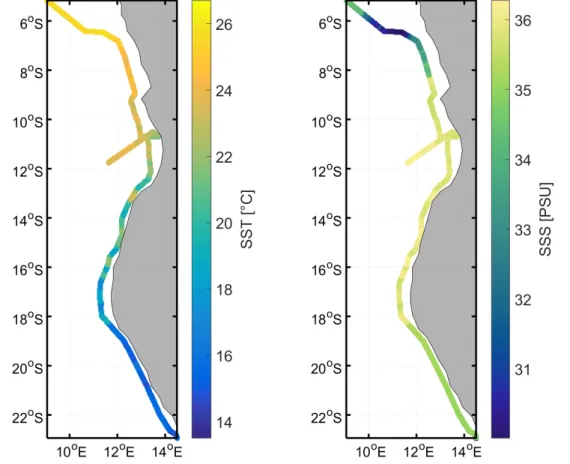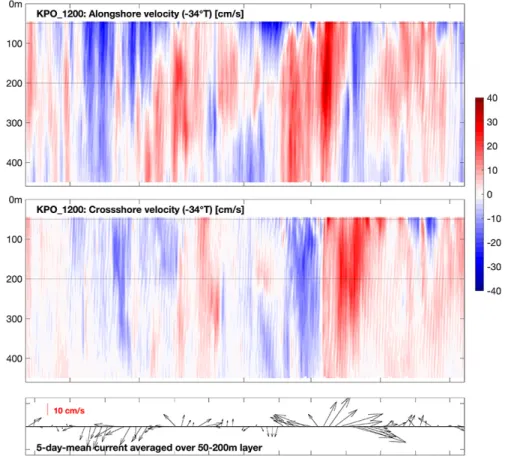Prof. Dr. Peter Brandt Meteor cruise 158
2
ndWeekly Report M158, Walvis Bay-Recife
Sep. 23-29, 2019
The second week of the Meteor cruise M158 focused on measurements on the Angolan shelf and on the subsequent transit to the equator. With underway measurements and occasional CTD and microstructure stations, we followed the continental slope off Angola northward to about 11°S. Thereby, we passed through the Angola-Benguela frontal zone, where temperatures rose several degrees from south to north within a few hundred kilometers (Fig. 1).
Fig. 1: Sea surface temperature and salinity along the cruise track of M158 (Anna Christina Hans).
Already on Sunday night, work began along the 11°S section. This hydrographic and current section was measured for the first time in July 2013 during the METEOR cruise M98. During that cruise, a long-term mooring in the core of the Angola Current was deployed for the first time, which has now been successfully redeployed for the fifth time (Fig. 2). The mooring of the 4th deployment had surfaced in mid-July and drifted for a while off the Angolan coast. With great commitment, the mooring was recovered by our Angolan colleagues and has now been handed back to us. The acquired velocity data showed particularly interesting strong flow signals of the eastern boundary current, which can be interpreted in the coming weeks in comparison to satellite and
Prof. Dr. Peter Brandt Meteor cruise 158
other data (Fig. 3). Here we would like to thank our Angolan colleagues who have helped us receiving back the scientific instruments and the acquired datasets.
Fig. 2: Deployment of the current meter mooring off Angola from the stern of RV METEOR (Photo: Alba Filella Lopez de Lamadrid).
Fig. 3: The mooring time series of the Angola Current shows high variability with particularly strong currents in February / March 2019 (Rodrigue Anicet Imbol Kongue).
Prof. Dr. Peter Brandt Meteor cruise 158
The analysis of the various data obtained along the 11°S section is progressing well, and in panel discussions and seminars we try to explain within our interdisciplinary research group our findings on currents, hydrography, biogeochemistry, phyto- and zooplankton from the point of view of physicists, biogeochemists or biologists to provide the best possible insight into the different processes and their effects on climate, carbon and nutrient cycles, and ecosystem.
In the meantime, we reached the equator at 5°E where we began our interdisciplinary research program to study equatorial circulation, mixing, tracer distribution, phytoplankton and zooplankton, as well as carbon fluxes to depth. For the various working groups, a lot of water samples are needed, so at some locations, we perform CTD stations twice. The CTD work is accompanied by the usage of a plankton net and microstructure measurements.
The short time of transit through the territorial waters of Equatorial Guinea, for which we did not receive a research permit, was used to recover from the intense work on the 11°S section. Of course, there is always time for scientific discussions and seminars, but also leisure activities, such as table football tournament or in the gym.
Overall, the mood is very good and particularly characterized by a very good cooperation with the crew.
Greetings from the tropics in the name of the cruise participants of M158, Peter Brandt
GEOMAR Helmholtz Centre for Ocean Research Kiel

